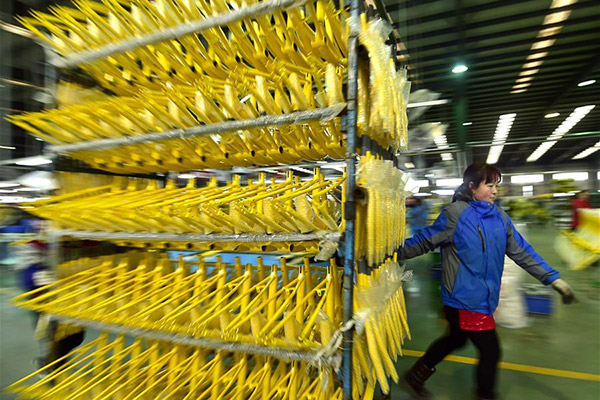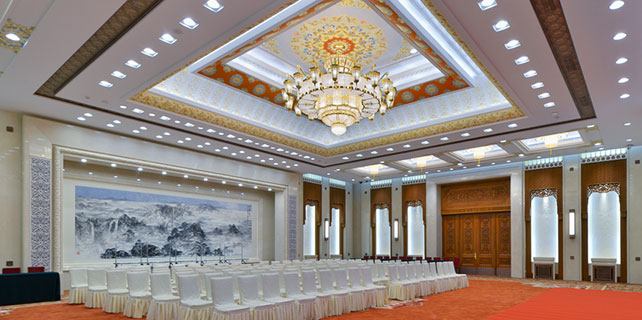Bicycle-sharing boom reinvigorates manufacturers, challenges management
 |
|
A worker transports parts of ofo bikes in Flying Pigeon bicycle's manufacturing factory on Feb 21, 2017, in Tianjin. [Photo/Xinhua] |
TIANJIN - China's bicycle manufacturers are poised for a resurgence thanks to the booming bike-sharing industry.
The once dominant two-wheelers have given way to cars in recent years due to China's rising middle class. However, new bike-sharing services allow commuters to escape traffic gridlock and public transit for as little as 1 yuan ($0.15) per hour. Users can unlock bicycles with a mobile app and drop them off anywhere for the next customer.
In the past couple of years, 29 brands have sprung up, placing more than 3 million bicycles on streets around the country and wrestling for domestic market share. Demand in China is estimated at around 20 million bikes, according to Liu Xuequan, who heads the association of the bike industry in Tianjin, the country's largest bicycle manufacturing base.
New boost
"The new business has given a push to a group of traditional bike manufacturers," Liu said.
A report from Beijing-based BigData Research showed the number of shared bicycle users exceeded 18 million as of the end of 2016 and is expected to approach 50 million by the end of this year.
"When there were no bike-sharing services, we had peak and slack seasons in production. But now, we are busy all year round," said Zhang Jinying, an executive with the Tianjin-based manufacturer Flying Pigeon, a supplier for bike-sharing service ofo.
Four Flying Pigeon factories are scheduled to produce 900,000 bikes in March, with half of the orders from bike-sharing start-ups, Zhang said, adding that the manufacturer is working to expand production capacity and hire more workers due to ever-increasing orders.
The production standard for shared bikes is higher than for ordinary ones, since shared bikes require better endurance of some parts, according to Zhao Kun, a R&D director at Flying Pigeon.
A bicycle's service life is around two years if five users ride it each day. That may lead to 10 million bikes that need repairs per year, creating a new market for manufacturers to compete for, according to Liu Xuequan.
Management headache
Fleets of brightly-colored shared bikes are becoming ubiquitous in big cities like Beijing and Shanghai.
They have also secured backing from the government. China's Minister of Transport Li Xiaopeng said in late February that bike sharing is innovative and should be encouraged and supported.
However, problems have arisen when users park bikes haphazardly, tarnishing the city's image and blocking traffic.
There have been a number of news reports of angry business owners or security guards who have damaged the bikes or stacked them up because the jumbled vehicles had affected their work.
In late November, urban management officers in Chengdu city, capital of southwest China's Sichuan province, confiscated nearly 200 shared bikes because they violated the city's parking regulations. A similar seizure was reported in Hangzhou city, capital of East China's Zhejiang province, in December.
Some bikes have been damaged by drivers of motorbike taxis and electric tricycles because bike-sharing has taken away their passengers. Vandals and ill-behaved bike users have also caused trouble.
A set of photos that have gone viral have exposed such acts: abandoning bikes in a river, inserting needles into the saddle, and destroying QR codes in order to steal bikes.
In one photo, a yellow bike was reduced to its basic frame after being stripped of most of its parts, with a caption saying "Well, no problem, it is for 'sharing.'"
Such vandalism has prompted police intervention. On Feb 28, Chengdu police detained a man who ran a traditional bike rental business for burning and burying more than 10 shared bikes from various brands two days earlier.
Liu Xuequan disclosed that manufacturers are working on technical upgrades to prevent bikes from being dismantled or stolen.
Ofo founder and CEO Dai Wei said bike misuse has not created a notable loss for the company.
"During the past three months, 'inactive bikes,' which means they might have been damaged or taken home, only accounted for 1 percent of the total," he said, while calling all users to treat the vehicles nicely.
Ofo has hired workers to ensure the bikes are returned in good condition and parked properly. Rival Mobike has enlisted its users to help track down lost bikes and maintain orderly parking. Some local governments have rolled out rules to regulate parking.
Minister Li Xiaopeng said it requires joint efforts from the government, service providers and customers to maintain smooth rides for shared bikes.









